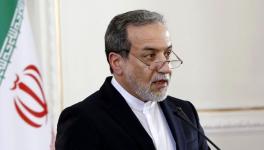Israel Grapples With its ‘Suez Moment’

Israeli Prime Minister Benjamin Netanyahu with newly drafted soldiers, Israel, April 16, 2024
The United States’ diplomatic initiative to issue a joint statement condemning Iran on its “Attack on the State of Israel” has ended in fiasco, as there were hardly any takers for it from outside of the Western bloc of nations.
This is a crushing blow to American self-esteem. The unkindest cut of all is that Turkey, an important NATO power and a West Asian powerhouse, whom President Joe Biden is personally wooing lately, refused to sign up on the joint statement.
The eight defectors from the Global Majority who complied with the US diktat are two mavericks each from Latin America and the Eurasian region, South Korea and three Pacific island nations.
The entire Africa, West Asia, Central Asia, South Asia and the ASEAN region refused to associate with the US initiative! Of course, not a single Muslim country would touch the joint statement with a barge pole.
This tells a humiliating story of US isolation in the UN. The international community understands fully well the hypocrisy and the notorious doublespeak that characterises American diplomacy. In the emerging multipolar world, this awareness will inevitably translate as the propensity of the Global Majority to cherrypick.
The bottom line is that Iran did not attack Israel. Iran instead retaliated to a blatant attack by Israel against its sovereignty in violation of international law and the UN Charter, which was tantamount to an act of war.
More important, Iran’s retaliation was restricted to Israeli military targets that were involved in the Damascus attack on April 1 and was patently aimed at demonstrating its deterrent capability in future to discourage Israel from climbing the escalation ladder any further — and, all this while taking care to avoid civilian casualties.
Tehran publicised the raison d’être of its move against Israel and kept world powers informed about it much in advance, including, ironically, the Biden Administration with the full awareness that the US would alert Israel.
Therefore, the most charitable explanation that can be given to this idiotic move by the Biden Administration to drum up international condemnation of Iran is that President Biden’s tail is on fire in the campaign circuit in the US and is nowhere to be seen as Iran punctures the Jewish state’s aura of invincibility anchored on American military prowess.
The big question is how Prime Minister Benjamin Netanyahu will view Biden’s initiative — and, more importantly, US’ desperate attempt to block Palestinian statehood bid at the UN Security Council without casting a veto.
In fact, ignoring the joint statement issued in New York, he proclaimed from Tel Aviv that Israel has a mind of its own and will take its own decisions in its interests no matter what its allies or friends might counsel. It is a barely disguised barb even as the representatives of Christian nations from Europe are journeying to Israel in the recent days to buttress the US attempts to mollify Netanyahu.
Apparently, Netanyahu asserted in the presence in Tel Aviv of the UK foreign secretary David Cameron and German foreign minister Annalena Baerbock that Israel will indeed climb the escalation ladder — showing the middle finger at the two visiting politicians who were on the other hand, bending over backward to show solidarity with Israel as it faces the moment of truth. What is secret behind such reckless audacity on the part of Netanyahu?
Clearly, Netanyahu, a seasoned fighter in the dark and vicious jungle of Israeli politics, is dancing to several tunes. First and foremost, he is playing to the domestic gallery to assuage the hawkish sentiments of public opinion, especially the ultra-nationalists in his coalition.
Both Cameron and Baerbock reportedly urged Netanyahu to show restraint, warning that any additional direct hostilities against Iran might trigger a regional war. Both visiting dignitaries acknowledged publicly Israel’s right to make its own decisions. On his part, Netanyahu also expressed the hope that any Israeli retaliation to Tehran’s retaliation of April 13 would be executed “in a way that is smart as well as tough and also does as little as possible to escalate this conflict.”
Such play of words comes easily to the veteran British politician, but what lends poignancy to Cameron’s words is that Britain also would realise that it may as well be Israel’s “Suez moment” in West Asian politics.
In 1956, during the so-called Suez Crisis when the UK along with France and Israel invaded Egypt to seize control of the Suez Canal, Washington, appalled that military operations had begun without its knowledge, put pressure on the International Monetary Fund to deny Britain any financial assistance, which in turn compelled London to reluctantly accept a UN proposed ceasefire and withdraw.
Indeed, historians later estimated that the British misadventure to punch above its weight only highlighted the UK’s declining status and confirmed it as a second-tier world power.
Of course, Biden is not Dwight Eisenhower. But Cameron’s journey to West Asia at this point in time jogs memory. And his warning will not ring hollow in Netanyahu’s ears.
At any rate, Times of Israel reported earlier today, quoting Israeli television, that “Netanyahu shelved pre-prepared plans for retaliation against Iran’s weekend barrage,” after speaking with Biden. The Kan public broadcaster quoted a senior source, “The response won’t be what was planned any longer, diplomatic sensitivities won out. There will be a response, but it seems it will be different from what was planned.” The TV noted that the comment likely pointed to a weaker Israeli response than what had been approved.
The heart of the matter is that Tehran has given a strong message that it has formidable strategic capability in reserve to directly attack Israel. In reality, the Western/Israeli propaganda that nearly all the projectiles fired at Israel were interjected and “there was little damage,” blah, blah, is irrelevant.
Israeli decision makers are hard-headed realists who know that taking on Iran on own steam is way beyond their country’s capability — unless Biden orders direct US intervention in the ensuing war. This is really Israel’s “Suez moment.”
Israel is in critical need of new thinking to douse the “rings of fire” lit by the late Iranian general Qassem Soleimani that are closing in on it, which are endemic to the new era of hybrid wars. Ukraine is just about learning that bitter lesson when it seems all too late.
It is no coincidence that Iran’s president Ebrahim Raisi called Russian President Vladimir Putin yesterday to convey, according to the Kremlin readout, that Tehran’s “actions had been forced and limited. At the same time, he emphasised that Tehran is not interested in further escalation of tensions.”
The readout underscored that “the unresolved Palestinian-Israeli conflict was the root cause of the current developments in West Asia. The presidents confirmed Russia and Iran’s principled stance in favour of immediate ceasefire in the Gaza Strip, alleviation of the grievous humanitarian situation and creation of conditions for a political and diplomatic settlement of the crisis.”
Herein lies the germane seeds of new thinking, if only there are any takers in Israeli leadership. Russia can be helpful, if the signals from Moscow in the most recent days are to be weighed in.
Succinctly put, Raisi’s call to Putin on Wednesday followed a telephone conversation between Foreign Minister Sergey Lavrov and Iran’s Minister Hossein Amir-Abdollahian (at the initiative of the Iranian side) on previous Sunday, which itself was preceded just a day earlier by a discussion on phone between the Secretary of the Russian Security Council Nikolay Patrushev and head of Israel’s National Security Council Tzachi Hanegbi.
The Kremlin spokesmen Dmitry Peskov has since drawn attention to these ongoing “constructive” exchanges on the heightened tensions in the West Asian situation.
MK Bhadrakumar is a former diplomat. He was India’s Ambassador to Uzbekistan and Turkey. The views are personal.
Courtesy: Indian Punchline
Get the latest reports & analysis with people's perspective on Protests, movements & deep analytical videos, discussions of the current affairs in your Telegram app. Subscribe to NewsClick's Telegram channel & get Real-Time updates on stories, as they get published on our website.























